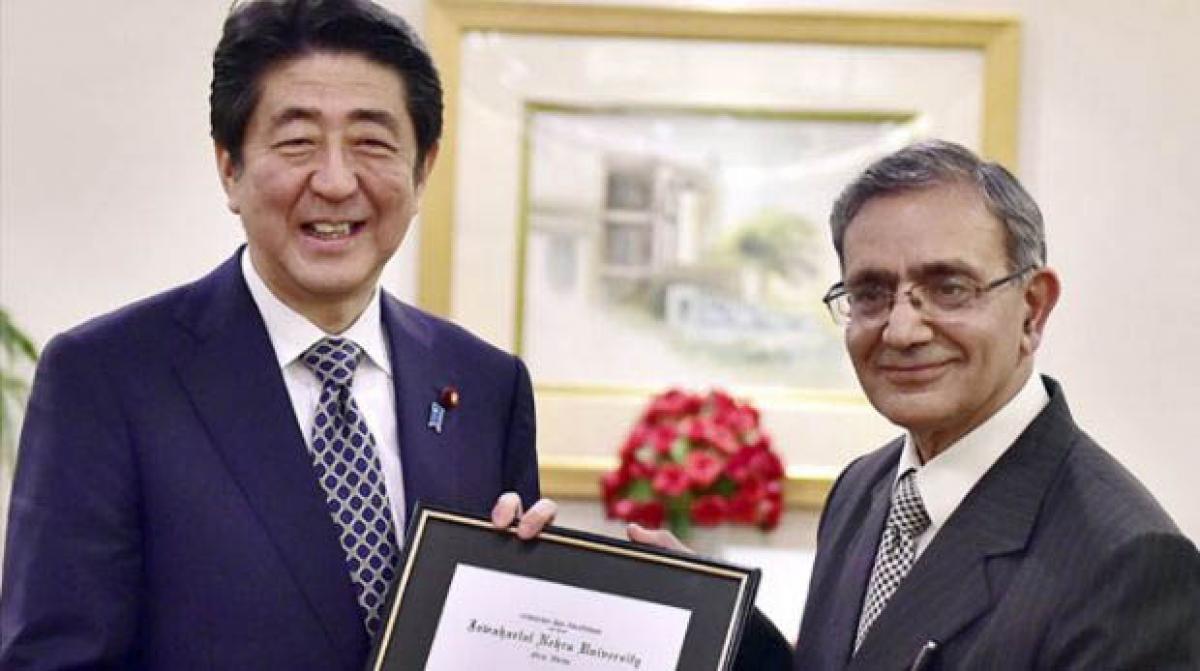Live
- G20 Leaders Will Talk About Climate, Taxes, and Trump's Return in Brazil
- COP29: CDRI announces $8 million funding for 12 projects to address climate crisis
- Anti-Telgu remarks: Actor Kasthuri Shankar moves court for bail
- Samsung AR Smart Glasses Set to Launch in 2025, Featuring Ray-Ban Meta-Like Design
- Kerala Industries Minister confident that new policy will boost plantation sector
- Madras HC plans inter-departmental monitoring committee to combat drug use in TN
- Bihar: Spotted deer dies due to heart attack in Banka district
- Mushtaq Ali T20: Shami to spearhead Bengal bowling attack, Gharami named captain
- Kharge's clarion call to oust Maharashtra's BJP-backed MahaYuti
- Why Ukraine’s Use of US Missiles Against Russia Could Lead to World War 3
Just In

x
Highlights
Japanese premier Shinzo Abe arrived here on Friday on a three-day visit for annual summit talks with Prime Minister Narendra Modi during which the two sides are expected to seal a Rs 98,000 crore deal for India\'s first bullet train track and deliberate on a civil nuclear pact.
Japanese premier Shinzo Abe arrived here on Friday on a three-day visit for annual summit talks with Prime Minister Narendra Modi during which the two sides are expected to seal a Rs 98,000 crore deal for India's first bullet train track and deliberate on a civil nuclear pact.
.jpg)
Abe, accompanied by a high-level delegation, was received at the airport by Union Minister of State for Finance Jayant Sinha.
In the 9th annual Indo-Japan summit talks on Saturday, Modi and Abe will review implementation of various decisions taken in course of last one year and are likely to focus on enhancing trade and investment between the two Asian economic powers.
Hours after he arrived, External Affairs Minister Sushma Swaraj called on Abe during which a host of issues of mutual interest figured.
"Carrying forward a positive legacy of friendship and cooperation: EAM @SushmaSwaraj calls on Japanese PM @AbeShinzo," External Affairs Ministry Spokesperson Vikas Swarup tweeted.
Welcoming Abe, Modi described him as a "phenomenal leader" and said his trip will further deepen the bilateral relations.
"Welcome to India @AbeShinzo. Your visit will provide new strength and vigour to India-Japan ties," Modi tweeted.
A number of agreements to expand cooperation in a range of areas are expected to be signed tomorrow after the summit talks which is likely to deliberate on a number of infrastructure projects including the ambitious smart cities initiative of Modi.
The bullet train network, set to be finalised, will link the India's financial hub Mumbai with Ahmedabad, the capital of Modi's home state, Gujarat. Bullet train between the two cities will cut travel time on the 505 kilometer route from eight hours to around three.
According to sources, the sides are working to make forward movement in the proposed nuclear deal.
After the talks, he will leave for Varanasi, which is Modi's Parliamentary constituency, where he will attend Ganga Aarti at famous Dasaswamedh Ghat.
Modi will accompany Abe during his nearly four-and-a-half-hour-long visit to Varanasi. Abe will return here in the evening and depart on Sunday.
The Japanese Prime Minister had accompanied Modi during his visit to Kyoto last year.
At the last Summit meeting held in Tokyo last year, the two prime ministers had agreed to elevate the relationship to "Special Strategic and Global Partnership".
Modi had visited Japan from August 30 to September 3 last year during which that country had announced doubling of its private and public investment in India to about USD 34 billion over a period of five years.
During the summit talks last year, Modi and Abe had agreed to enhance defence and strategic cooperation to a new level and also decided to speed up negotiations on civil nuclear deal.
While agreeing on greater defence equipment and technology cooperation, the two sides had decided to expedite discussions on modalities for the sale of Japanese US-2 amphibian aircraft.
Foreign Secretary S Jaishankar had held talks with top Japanese officials in Tokyo last month to finalise agenda and other details of Abe's visit here.
India and Japan have been expanding their economic and strategic engagement in recent years resulting in cooperation in a vast swathe of fields including defence and security.
The economic engagement witnessed significant rise after both countries signed a a Comprehensive Economic Partnership Agreement (CEPA) in 2011.

Next Story
More Stories
ADVERTISEMENT
© 2024 Hyderabad Media House Limited/The Hans India. All rights reserved. Powered by hocalwire.com







